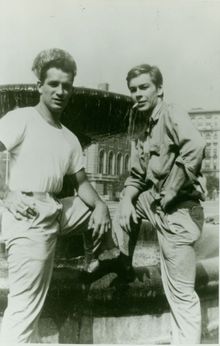Lucien Carr
| Lucien Carr | |
|---|---|

Jack Kerouac and Lucien Carr (right), 1944
|
|
| Born |
March 1, 1925 New York City |
| Died | January 28, 2005 (aged 79) Washington, D.C. |
Lucien Carr (March 1, 1925 – January 28, 2005) was a key member of the original New York City circle of the Beat Generation in the 1940s; later he worked for many years as an editor for United Press International.
Carr was born in New York City; his parents, Marion Howland (née Gratz) and Russell Carr, were both offspring of socially prominent St. Louis families. After his parents separated in 1930, young Lucien and his mother moved back to St. Louis; Carr spent the rest of his childhood there.
At the age of 12, Carr met David Kammerer (b. 1911), a man who would have a profound influence on the course of his life. Kammerer was a teacher of English and a physical education instructor at Washington University in St. Louis. Kammerer was a childhood friend of William S. Burroughs, another of St. Louis wealth who knew the Carr family. Burroughs and Kammerer had gone to primary school together, and as young men, they traveled together and explored Paris’s nightlife: Burroughs said Kammerer “was always very funny, the veritable life of the party, and completely without any middle-class morality.” Kammerer met Carr when he was leading a Boy Scout Troop of which Carr was a member, and quickly became infatuated with the teenager.
Over the next five years, Kammerer pursued Carr, showing up wherever the young man was enrolled at school. Carr would later insist, as would his friends and family, that Kammerer had been hounding Carr sexually with a predatory persistence that would today be considered stalking. Whether Kammerer’s attentions were frightening or flattering to the younger man (or both) is now a matter of some debate among those who chronicle the history of the Beat Generation. What is not in dispute is that Carr moved quickly from school to school: from the Phillips Academy in Andover, Massachusetts, to Bowdoin College in Brunswick, Maine, to the University of Chicago, and that Kammerer followed him to each one. The two of them socialized on occasion. Carr always insisted, and Burroughs believed, that he never had sex with Kammerer; Jack Kerouac biographer Dennis McNally wrote that Kammerer "was a Doppelgänger whose sexual desires Lucien would not gratify; their connection was an intertwined mass of frustration that hinted ominously of trouble."
...
Wikipedia
